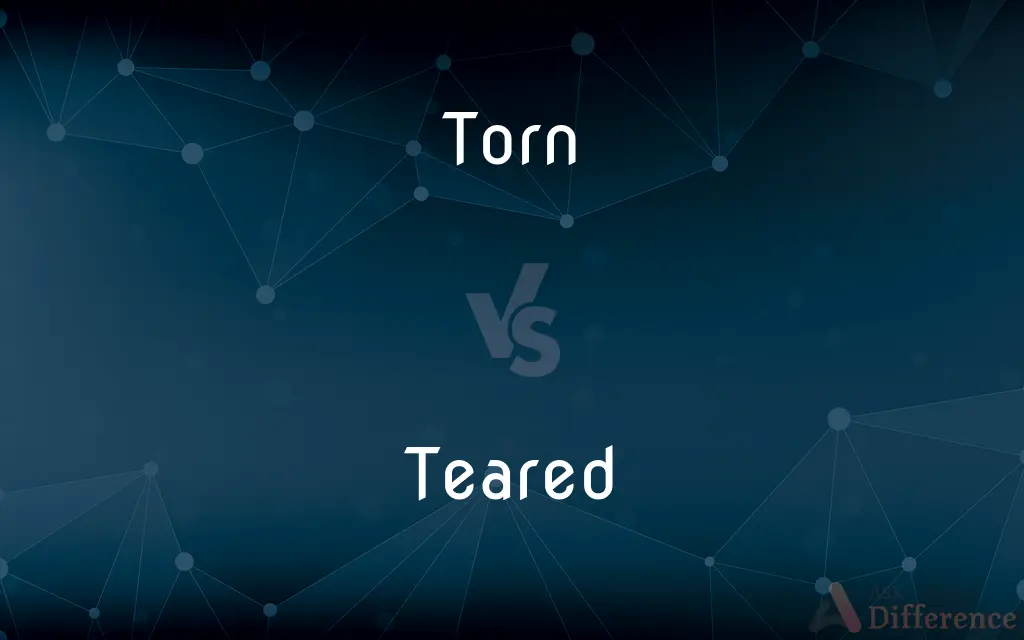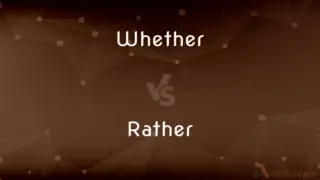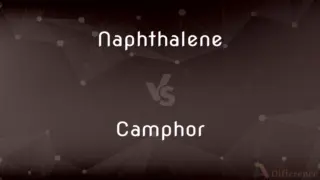Torn vs. Teared — What's the Difference?
By Maham Liaqat & Fiza Rafique — Updated on April 22, 2024
"Torn" is the past participle of "tear," meaning something has been ripped or divided, usually abruptly, whereas "teared" is a common misusage and not standard; the correct form after "tear" in past tense is "tore."

Difference Between Torn and Teared
Table of Contents
ADVERTISEMENT
Key Differences
"Torn" is used as an adjective or past participle to describe something that has been ripped or damaged, emphasizing the result of the action. On the other hand, "teared" is often mistakenly used when people mean "tore," the simple past form of "tear," which describes the action of ripping or pulling apart.
While "torn" conveys a state of being, reflecting the condition of an item that has been ripped, such as fabric or paper, "teared" does not fit in standard grammatical constructions pertaining to the verb "tear." Instead, "tear" follows the pattern: tear, tore, torn.
"Torn" can be used in various contexts, from physical descriptions of objects to metaphorical uses, such as describing feelings or relationships. In contrast, the use of "teared" should be corrected to "tore" or "tear" depending on the tense, to align with standard English usage.
The term "torn" also appears in many idiomatic expressions, such as "torn apart" or "torn between choices," which show the versatility of the word in describing intense situations or emotions. On the other hand, there is no idiomatic or standard usage of "teared," reinforcing its status as a non-standard form.
Comparison Chart
Form
Past participle of "tear"
Incorrect form of "tear"
ADVERTISEMENT
Usage
Describes a state or condition
Not standard or correct
Context
Used in both literal and metaphorical contexts
Incorrectly used for past tense
Examples
"The paper was torn."
Should use "tore" or "torn"
Correctness
Correct and standard English
Non-standard and incorrect
Compare with Definitions
Torn
Past participle of "tear," indicating something has been ripped or damaged.
The book cover was torn after it fell.
Teared
Incorrect usage; the correct past tense is "tore."
Incorrect: He teared up the letter. Correct: He tore up the letter.
Torn
Indicates conflict within a decision or between options.
He is torn between studying medicine or law.
Teared
Not applicable for proper grammatical construction.
There is no example because teared is not correct.
Torn
Refers to a damaged state of fabric or materials.
His jeans were torn at the knees after the fall.
Teared
Non-standard form often heard in colloquial speech.
Incorrect use might be found in casual, incorrect speech.
Torn
Used to describe a difficult emotional state.
She was torn between her career and her family.
Teared
Commonly misused in place of "tore" or "tearing."
Incorrect: She teared the fabric while sewing. Correct: She tore the fabric while sewing.
Torn
Often used in expressions like "torn apart."
The community was torn apart by the controversy.
Teared
Should be corrected in written and formal contexts.
Writers and speakers should replace teared with tore or torn.
Torn
Past participle of tear1.
Teared
To pull apart or into pieces by force; rend.
Torn
Past participle of tear(rip, rend, speed).
Teared
To cause to be pulled apart unintentionally, as by accident
Tore my pants on the barbed wire.
Torn
Having edges that are jagged from injury
Teared
To lacerate (the skin, for example).
Torn
Disrupted by the pull of contrary forces;
Torn between love and hate
Torn by conflicting loyalties
Torn by religious dissensions
Teared
To make (an opening) in something by pulling it apart or by accident
I tore a hole in my stocking.
Teared
To separate forcefully; wrench
Tore the pipe from the wall.
Teared
To divide or disrupt
Was torn between opposing choices.
A country that was torn by strife.
Teared
To become torn
The fabric does not tear easily.
Teared
To move with heedless speed; rush headlong
Tore off down the road.
Tore along the avenue.
Teared
To become filled with tears
The strong wind caused my eyes to tear.
Teared
The act of tearing.
Teared
The result of tearing; a rip or rent
The shirt has a small tear.
Teared
A great rush; a hurry.
Teared
(Slang) A carousal; a spree.
Teared
A drop of the clear salty liquid that is secreted by the lachrymal gland of the eye to lubricate the surface between the eyeball and eyelid and to wash away irritants.
Teared
Tears A profusion of this liquid spilling from the eyes and wetting the cheeks, especially as an expression of emotion.
Teared
Tears The act of weeping
Criticism that left me in tears.
Teared
A drop of a liquid or hardened fluid.
Teared
Simple past tense and past participle of tear|t=produce liquid from the eyes
Teared
(nonstandard) t=rip, rend, speed
Common Curiosities
Is "teared" ever correct to use?
"Teared" is not correct in the context of "tear" meaning to rip; the proper forms are "tear," "tore," "torn."
How do you use "torn" in a sentence?
"Torn" can be used to describe something that has been ripped, e.g., The flag was torn during the storm.
What is the correct past tense of "tear"?
The correct simple past tense of "tear" is "tore."
Is it common for people to use "teared" incorrectly?
Yes, it is a common mistake, but it should be corrected to maintain proper English.
Why is "torn" more versatile than "teared"?
"Torn" is the correct form and widely used in both literal and metaphorical contexts, making it versatile and broadly applicable.
How can I remember the correct past tense of "tear"?
Remember the sequence: tear (present), tore (past), torn (past participle).
What should I use instead of "teared" if I made a mistake?
If referring to the past action of ripping, use "tore"; if describing the result, use "torn."
What is an example of "torn" used in literature?
In literature, "torn" is often used to describe conflicts, such as a character being "torn" by moral dilemmas.
Can "torn" be used metaphorically?
Yes, "torn" is often used metaphorically to describe being in a state of indecision or emotional conflict.
What is the difference between "tore" and "torn"?
"Tore" is the simple past tense indicating the action of ripping at a specific time, while "torn" is the past participle used to describe the state of something that has been ripped.
Share Your Discovery

Previous Comparison
Whether vs. Rather
Next Comparison
Naphthalene vs. CamphorAuthor Spotlight
Written by
Maham LiaqatCo-written by
Fiza RafiqueFiza Rafique is a skilled content writer at AskDifference.com, where she meticulously refines and enhances written pieces. Drawing from her vast editorial expertise, Fiza ensures clarity, accuracy, and precision in every article. Passionate about language, she continually seeks to elevate the quality of content for readers worldwide.














































